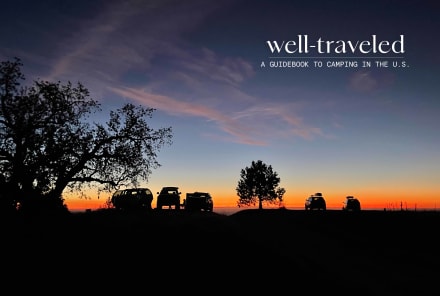Advertisement
From Feeling Into Action: Jonathan Safran Foer's 3 Tangible Tips To Save The Planet


We'll go ahead and wager that you care about the Earth. Even if some of the details can become a bit sticky, it's not so radical to assume that we all want to bolster this planet we call home. Where it gets tricky—and sometimes divisive—is how we can translate those feelings into tangible steps. Not only is "saving the planet" a giant undertaking, but it's difficult (and overwhelming) to visualize.
That's why bestselling author of We Are the Weather and environmental activist Jonathan Safran Foer recommends micro-changes to help combat climate change, slowly but surely. "We need leaders who legislate change," he says on this episode of the mindbodygreen podcast. "But we can't do it unless individuals reshape their habits, both because of the very straightforward impact those changes will have on the environment but also because of how those things will provoke systemic change."
He adds, "We cannot save the planet with micro-changes, [but] we cannot save the planet without micro changes."
Below, find Foer's go-to micro-changes to make real moves toward combating climate change. Of course, there's so much more you can do (saving the planet is a giant undertaking, remember?), but these tips are some helpful ways to get started:
He codifies his values.
Value statements are important—articulating what you believe in from a broader perspective is key for setting and navigating your goals. But, says Foer, real progress stems from changing your behavior to meet your value system. "For most people, [value statements] don't guide their daily lives and the choices they make." Rather, codifying those values into concrete plans can help people visualize the shifts they can make in their everyday lives.
For example, Foer notes, attending climate marches is a huge part of inspiring systemic change, and taping up posters is a great north star to guide your goals—but those actions might not affect your day-to-day. "Better than that poster on your wall would be a list you tape to your refrigerator that says, 'Here's how I plan to eat, here's how I plan to drive, here's how I plan to fly,' and so on and so forth." Consider them your climate resolutions.
Meaning, give yourself concrete descriptions of change: Attach days of the week, amounts, and numbers to your value statements. According to Foer, that's the "best way to move from feeling to action."
He cuts down on meat consumption.
If you're familiar with Foer, you know that he's quite the outspoken vegetarian. Food, he explains, is a choice that many of us make multiple times a day—and animal agriculture has a pretty dramatic effect on the environment. "Animal agriculture is the leading source of both methane and nitrous oxide, which are two of the most powerful greenhouse gases," he notes.
That's not to say he thinks everyone should have an all-or-nothing relationship with meat—but he does believe our levels of consumption as a population need to drastically change.
According to an analysis of the relationship between animal agriculture and the environment1, "Citizens of Europe, the United Kingdom, and the United States need to reduce meat consumption by about 90% and dairy by about 60% in order to avoid what the authors call, 'irreversible climate collapse.' Not to say that we all need to become vegans or vegetarians, and not to say that we need to make those reductions tomorrow, but it is what we need to be aiming toward."
Again, these levels won't drop overnight, but if everyone commits to this micro-change (even a small downsize!), we could potentially make some powerful strides.
He never lectures; he models by example.
To truly combat climate change, we need a collective effort, full stop. However, there's a fine line between inspiring people to make changes to their daily lives and scaring them into submission. That said, Foer has a show, don't tell mentality: "The people who have changed me most, it's almost never because of an argument," he explains. "It's almost always because of witnessing their choices [and] being drawn to ask about them rather than being put on the defensive."
So rather than telling someone they shouldn't eat a lot of meat, he simply cuts down on his own consumption (a nod back to point No. 2). Then, if people ask him questions, he's happy to explain the why behind his actions.
Of course, it's important to be realistic here—people who are not interested in changing their ways most likely won't, no matter how long they witness your choices. "The people that I am most interested in are the people who already think of themselves as environmentalists, people who are already open to all kinds of change but hadn't yet contemplated in a serious way how eating differently might be their best way to participate." For them, modeling by example may be the visual they need to make changes.
The takeaway.
To really make moves toward saving the planet, Foer says we need to transform our feelings into actions. Because, chances are, we all feel strongly about the Earth and its longevity in some form or another—lasting changes, though, require those next steps.
Watch Next
Enjoy some of our favorite clips from classes
Enjoy some of our favorite clips from classes
What Is Meditation?
Mindfulness/Spirituality | Light Watkins
Box Breathing
Mindfulness/Spirituality | Gwen Dittmar
What Breathwork Can Address
Mindfulness/Spirituality | Gwen Dittmar
The 8 Limbs of Yoga - What is Asana?
Yoga | Caley Alyssa
Two Standing Postures to Open Up Tight Hips
Yoga | Caley Alyssa
How Plants Can Optimize Athletic Performance
Nutrition | Rich Roll
What to Eat Before a Workout
Nutrition | Rich Roll
How Ayurveda Helps Us Navigate Modern Life
Nutrition | Sahara Rose
Messages About Love & Relationships
Love & Relationships | Esther Perel
Love Languages
Love & Relationships | Esther Perel
What Is Meditation?
Box Breathing
What Breathwork Can Address
The 8 Limbs of Yoga - What is Asana?
Two Standing Postures to Open Up Tight Hips
How Plants Can Optimize Athletic Performance
What to Eat Before a Workout
How Ayurveda Helps Us Navigate Modern Life
Messages About Love & Relationships
Love Languages
Advertisement

This Little-Known Supplement Helps Women Sleep & Decreases Signs Of Depression
Molly Knudsen, M.S., RDN

This Little-Known Supplement Helps Women Sleep & Decreases Signs Of Depression
Molly Knudsen, M.S., RDN









